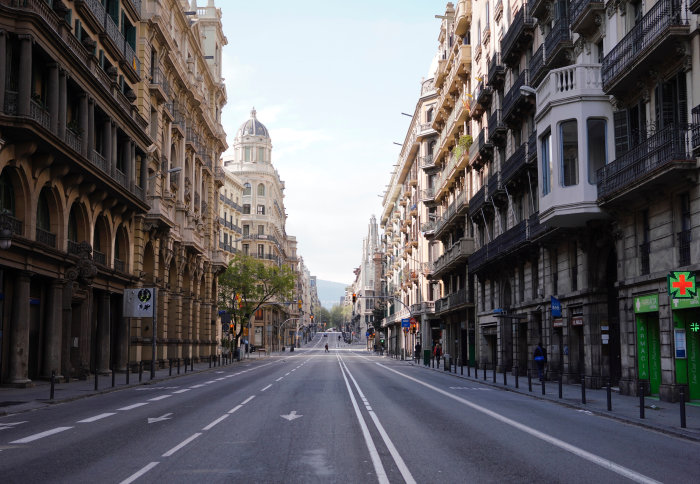Consumer spending in Spain has halved during coronavirus lockdown says analysis

Empty street in Barcelona due to coronavirus outbreak
Economic activity in Spain has fallen in the first three months of 2020 compared to the same period last year, says a new analysis.
An examination carried out by Imperial College Business School, University of Cambridge and University of Edinburgh of 1.4 billion anonymised credit and debit card transactions during the first three months of 2020, shows that spending in Spain post-lockdown was on average 49 percent lower than the same date the previous year.
The researchers used transaction data from the Spanish bank BBVA to track how economic activity has responded to the COVID-19 crisis and the policy measures being put in place to contain it.
Nosedive in consumption
The researchers found evidence of a dramatic increase in consumer spending in the days just before Spain’s lockdown began on the 14 March, when daily expenditure rose by 20 percent compared to the national average for the year.
"This analysis of how a country reacts to economic shocks in real time has potential value for researchers and policy-makers seeking to manage the impact of COVID-19.” Dr Stephen Hansen Associate Professor of Economics
After the state of emergency was declared, consumer spending continued to fall with the average credit card expenditure falling by 49 percent compared to the same period a year ago.
Dr Stephen Hansen, Associate Professor of Economics at Imperial College Business School, one of the authors of the study said: “These large datasets from credit and debit card transations, reveal the extent to which a western country such as Spain is impacted by a pandemic as people change their behavior as a result of living in lockdown. This analysis of how a country reacts to economic shocks in real time has potential value for researchers and policy-makers seeking to manage the impact of COVID-19.”
Increase in food spending
According to the study, food is the only sector that has registered an increase in spending in Spain, having doubled the week just prior to the state of emergency and continuing with a year on year rise of 60 percent. In the days leading up to the Easter holidays, food spending increased by 95 percent.
Large retailer outlets and food providers have seen an increase in internet shopping, and online spending for healthcare products has doubled. Meanwhile spending on home delivery services from restaurants and bars has increased by 50 percent.
The study also shows a 90 percent decrease in spending on leisure, consumer goods including clothing and travel and the entertainment sector.
Rise in internet purchases
The impact on e-commerce has been much lower, but with drops as much as 44 percent during the first week of the state of emergency. Internet purchases have represented 20 percent of total card transactions during the lockdown.
Decrease in tourist spending
The study also revealed the impact the coronavirus has had on tourism spending in Spain. Foreigners returning home and tourism coming to a halt has resulted in a 60 percent drop of foreign resident spending in Spain.
The working paper, “Tracking the COVID-19 Crisis with High-Resolution Transaction Data” can be viewed on the University of Cambridge website.
Article text (excluding photos or graphics) © Imperial College London.
Photos and graphics subject to third party copyright used with permission or © Imperial College London.
Reporter
Laura Singleton
Communications Division